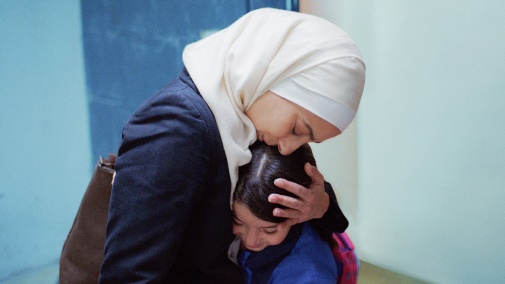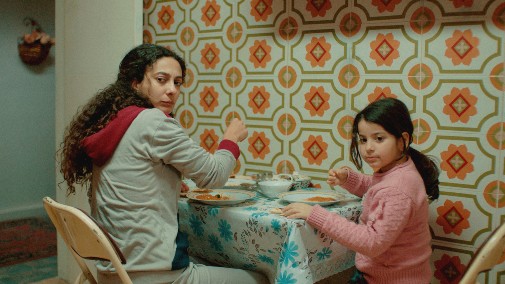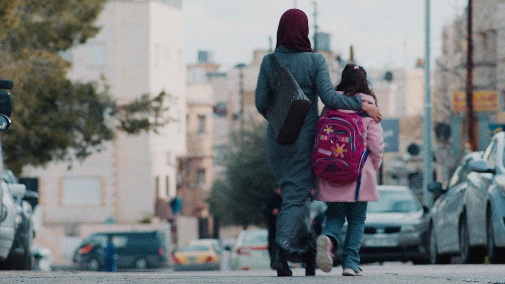TIFF '23: A widow's plight is the nightmare of "Inshallah a Boy"
 Tuesday, September 12, 2023 at 3:45PM
Tuesday, September 12, 2023 at 3:45PM 
Some films are like nooses, rope around the neck, tightening exponentially with ever-strengthening pulls. Air runs out, suffocation on the horizon if not for the mercy of a final crack. Neck broke, the kiss of death at long last, and let the credits roll. The rope is tension born out of misery and misfortune, a path of escalating tragedy that can easily fall into cheap suffering for suffering's sake. We've all seen such films, bursting with good intentions but way too mired in the character's pain to ever look beyond it. What should be empath sours into pity. So, when an artist risks the noose without capitulating to its snags, it's cause for celebration.
Then, let's cheer for Inshallah a Boy, the first Jordanian production to screen at Cannes and a prime candidate to be the country's Oscar submission…
Amjad Al Rasheed's feature debut strikes a note of anxious humor right as it starts, watching as lower middle-class nurse Nawal tries to retrieve a bra from the clothesline beneath her apartment window. Nothing seems to do, and when her fiddling jettisons the intimate garment down to the street, she's quick to hide in the shadows. A man she doesn't know picks it up, so better forego the bra than deal with that mess. Later, in bed with her husband, we witness a scene less attuned to what one might expect from a proper Muslim wife. Nawal wants to try for another baby and urges the man to have sex, but he's too tired tonight. Her frustrations vibrate off the screen.
These quotidian observations alone could build up to an interesting flick examining the subtle frictions affecting a regular woman's life in contemporary Jordan. Inshallah a Boy won't be that story, choosing a more extreme approach kickstarted by the plot the morning after. Everything seems normal at first, Nawal busying with breakfast while her husband slumbers a bit later than ideal. When he doesn't show up to eat, the wife sends their daughter, Nora, to check on him. Yet, he still won't wake. Without worrying over the body, the camera still lets us know the horror that befell Nawal.
Resting on Mouna Hawa's expressive face, it lets her do the heavy lifting – shock and grief revolving within an instant of terrible discovery. From then on, everything that could go wrong goes wrong for poor Nawal. Thanks to Jordanian inheritance law, in the absence of a will and no male heir, a man's property won't go directly to his wife and daughter but also to his siblings. The deceased's brother, Rifqi, is quick to make his claim on the apartment, effectively threatening Nawal with homelessness or a new life where he'll take Nora's custody. The matter of a pick-up truck causes much consternation, as Rifqi had lent his brother money to pay for it, and the installments hadn't yet been fulfilled.

For some unfathomable reason secret to her heart, Nawal refuses to sell the vehicle. Instead, she tries to scrounge money by selling her bedroom furniture and asking for a wage advance at her job, working for an upper-class family as their wheelchair-bound matriarch's caretaker. As a widow without a son, Nawal doesn't own her home and has no right to it, her car, or even her daughter. Her own brother wants her to let Rifqi take the house and the pick-up, and raise Nora himself while Nawal would be remarried to a proper second husband – no matter what she thinks on the subject. A woman's powerlessness is the rule, insidious to every aspect of Nawal's current plight.
Wavering between social classes and the heroine's growing need for judicial intervention, the screenplay sketches a wide mural of a woman's hardship under modern Jordan's Sharia Law. Going from sexist taunts on the streets to the matrimonial advice cum reprimands of Nawal's employer, who thinks her daughter should put up with her husband's extra-marital dalliances. Compared to that woman, who, unlike Nawal, never covers her head, our protagonist reveals herself as a figure with no declared political convictions past her dislike of the hijab when it comes to Nora. She's forced to care by her circumstances, and that's all.
The widow is no rebellious spirit, seeing the jilted -later abused- wife's unplanned pregnancy as a blessing instead of a burden, no matter how much the expecting mother wants to procure an illegal abortion. Eventually, the two women will be bound in sisterhood, born not from shared values but compatible needs, a pragmatic union. After all, while one needs to stop her pregnancy, the other needs to be pregnant. If Nawal has a son from her late husband, she'll get to reclaim the property. Within this whirlwind of injustice, Nawal's lack of radicalism is somewhat refreshing without contradicting the film's social commentary.
If nothing else, that part of her personality posits the issues the drama broaches as something that will even affect the lives of those who'd otherwise want or be willing to conform to the system. Didacticism avoided, Inshallah a Boy settles into character study whose messages derive organically from the narrative arc. In this strategy, the proliferation of incidental details brings authenticity to the fore, suggesting portentous readings without imposing them. One thinks of the husband's locked phone constantly receiving mysterious calls, parts of his life away from Nawal we never know, and even the rodent pest that invades her kitchen like the brother-in-law invades the home.

So rich is the leading lady's characterization that some of the other players can feel like sketches instead of fully-fledged portraits. Nora suffers significantly from this, though the filmmakers' fidelity to Nawal's limited perspective means such things can be more accurately described as deliberate features, never accidental flaws. Some actors would buckle under the pressure such creative strategies confirm upon them, but Mouna Hawa excels past that first shock of bereavement. Indeed, through her reaction, a miraculous twist at the end of Inshallah a Boy circumvents accusations of cheap resolution. The performer's portrait of relief is complex, making you feel the noose loosening for a merciful breath, a faint gasp of hope.



Reader Comments (1)
Adding it to my watchlist. Thank you very much.